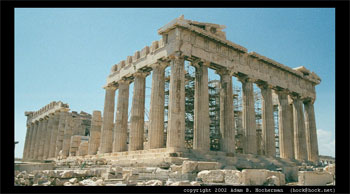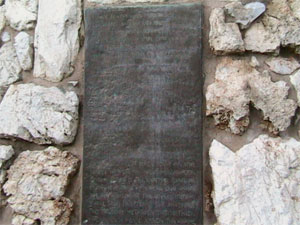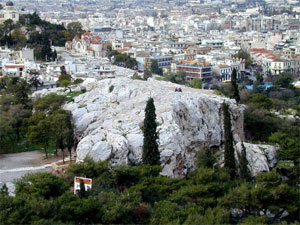From Synagogues and Sanctuaries to Bars and Boardrooms:
The Apostle Paul at the Areopagus
For Sunday April 27, 2008
Lectionary Readings (Revised Common Lectionary, Year A)
Acts 17:22–31
Psalm 66:8–20
1 Peter 3:13–22
John 14:15–21
 |
The Acropolis in Athens. Photo © 2002 by Adam B. Hocherman. |
At lunch last week it was my pleasure to meet a young computer scientist from London who for the last four years has taught at Stanford as a specialist in artificial intelligence. Neil is also a deeply commited Christian who's exploring what it might look like to witness in the work place among his unchurched, thirty-something friends. I was fascinated as he described how he and his buddies back in London understood "church." Forget church at 11am on Sunday, he said. Rather, meet your friends for sports and games on Sunday, then repair to the pub. Meet people on their own terms and at their own places, he said, rather than expect them to come to your church.
Neil sounded like a modern version of Paul at the Areopagus. The "Areopagus" was both a place and a group. It's a small rocky hill northwest of the Acropolis in Athens (Greek for "hill of Ares" or in Latin "Mars Hill"). More importantly, the Areopagus was the most prestigious and venerable council of elders in the history of Athens, so-named because it met on that site. Dating back to the 5th-6th centuries BCE, the Areopagus consisted of nine archons or chief magistrates who guided the city-state away from rule by a king to rule by an oligarchy that laid the foundations for Greece's eventual democracy. Across the centuries the Areopagus changed, so that by Paul's day it was a place where matters of the criminal courts, law, philosophy and politics were adjudicated.
Paul, who had been publicly proclaiming the Jesus Way in the marketplaces and synagogues (Acts 17:17) with anyone and everyone, was ridiculed by these culture shapers and opinion makers as a "babbler" who advocated "foreign gods," perhaps understandably so if you were an influential Athenian. But they loved to learn the latest, so they invited Paul to a meeting of Athens's most powerful and important venue to explain what they derided as his "strange ideas."
At our worst, we Christians have isolated and insulated ourselves from our culture's mainstreams. We can be inward-looking, self-absorbed, self-important, and cloistered, instead of engaging people at our modern day Mars Hills. I remember a pastor friend who had a parishioner whose child had gone to Christian schools for so long that he was barely functional in the world at large. Another pastor confided to me several summers ago that at his annual denominational meeting delegates were, in all honesty, merely "talking to themselves." And I still remember exactly where I was twenty-five years ago when one of my seminary professors remarked to me that he had never entered a movie theater.
But at our best, Christians like Neil have always been just as comfortable living, learning and sharing the Gospel in the marketplace of ideas as in the ministry of the church, in bars and board rooms as well as in basilicas, in university lecture halls as easily as in church fellowship halls. In an outward, centrifugal movement modeled after Paul at the Areopagus, believers have welcomed the opportunity to meet real people where they really live, work, and think, in order to gain a hearing for their "strange ideas" about repentance, rebirth, and the resurrection.
When my friend Scott teaches seminary courses on evangelism, for example, he routinely requires his students to attend art exhibits, interview artists in their studios, and to find their way to avant garde film festivals.
 |
Plaque at the Areopagus commemorating Paul's sermon. |
In a most creative and ambitious Areopagean endeavor, in 1992 Dennis and Eileen Harvey Bakke of the Mustard Seed Foundation created the Harvey Fellows Program (www.harveyfellows.org). Each year they identify, equip, encourage and fund Christian graduate students who are enrolled in a program ranked in the top five of their field. They actively seek to interface the Christian faith with the secular marketplace, especially in those strategic spheres of influence where Christians might be under-represented — media, government, science, academia, and so on. In the sixteen years since the program’s inception, they've invested over four million dollars in 225 Harvey Fellows worldwide, representing twenty-four countries and over forty academic and vocational fields. Paul would have approved.
That same year in 1992 Christian graduate students at Harvard inaugurated what eventually became known as the Veritas Forums, resulting in a wonderful book called Finding God at Harvard (1997) that contains the Christian stories of over forty Harvard faculty, alumni, and friends. Their stated mission, too, is decidedly Areopagean: "We create forums for the exploration of true life. We seek to inspire the shapers of tomorrow’s culture to connect their hardest questions with the person and story of Jesus Christ" (see www.veritas.org). In partnership with over 80 major universities now, the Veritas Forums have brought the Areopagus to intellectuals, exploring anything and everything in public university settings that incorporate performances, lectures, music, film, seminars, debates, and the like in interactive formats intended to encourage rather than suppress honest, public dialogue and debate.
Paul's confidence for addressing a venue such as the Areopagus rested upon a twofold rationale. First, as he told King Agrippa after he was arrested and accused of insanity ("Your great learning is driving you mad!"), the message and events of the Gospel were "not done in a corner" (Acts 26:26). They are matters of historical record and open to public debate, discourse, and inquiry for all honest seekers. In that sense the Areopagus was the most natural and fitting of venues for Paul.
Second, as Paul preached to the Athenians, he believed that God "made the world and everything in it," and that every single person was "God's off-spring," so in his mind there was no person or sphere of influence outside of His care and concern. All of so-called "secular" life, and not just "sacred" realms, were spheres of God's loving presence, or at least potentially so — law, literature, medicine, education, the arts, business, government, science, quite literally anything and everything. So, in his own Christian way, Paul viewed the venerable Areopagus as just another place where the Lord of all creation had gone before him and was already present; indeed, said Paul to the Athenians, "He is not far from each one of us."
The epistle for this week hints at the purpose of these Pauline, evangelistic forays, which is not the acquisition of power, the manipulation of public opinion, or victory in debate, but rather the opportunity to "give a reason for the hope that is in you." The manner in which believers express their hope, says Peter, is characterized not by belligerent rhetoric or bellicose power-politics, but instead by "gentleness and respect" (1 Peter 3:15-16).
 |
A closer view of the Areopagus. |
What sort of reception did Paul receive at the Areopagus? Early in the book of Acts we read that the first Christians "enjoyed the favor of all the people" (Acts 2:47). But a few chapters later a raging mob stoned Stephen to death and scattered the church (Acts 7). I have always admired Luke's candor regarding Paul's reception among the Athenians: some people "sneered" when they heard him speak about the resurrection, others took a rain check and asked to learn more at a later date (a polite put-off or honest interest?), and a few believed, namely Dionysius who was a "member" of the Areopagus, a woman named Damaris, and "a number of others" (Acts 17:32–33). With that, we read that "Paul left Athens and went to Corinth."
For further reflection
* How and why do Christians become so isolated and ingrown?
* Can you think of other positive examples like Neil, the Veritas Forum, or Harvey Fellows Program?
* What practical lessons can we draw from Paul's speech in Athens?
* See the book Finding God at Harvard (1997).
Image credits: (1) Adam B. Hocherman; (2) & (3) Dana and Cindy Bratton, YWAM missionaries to Thailand.





